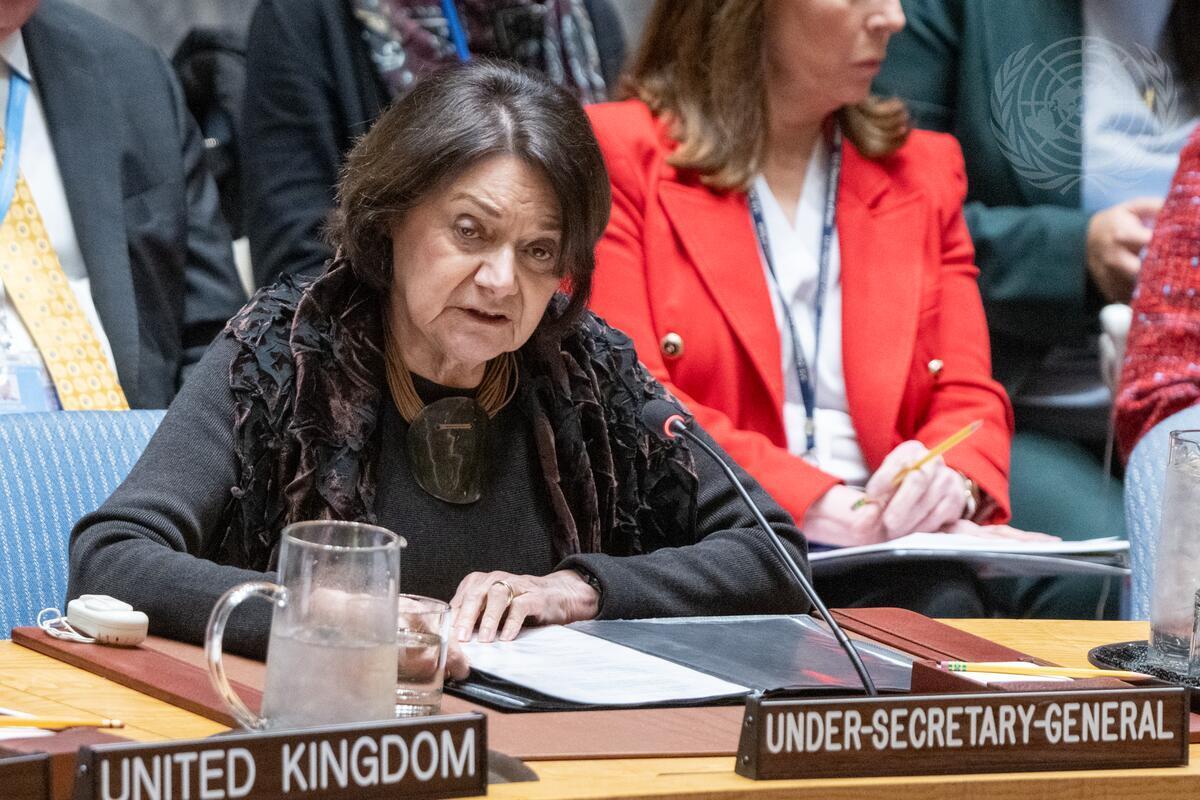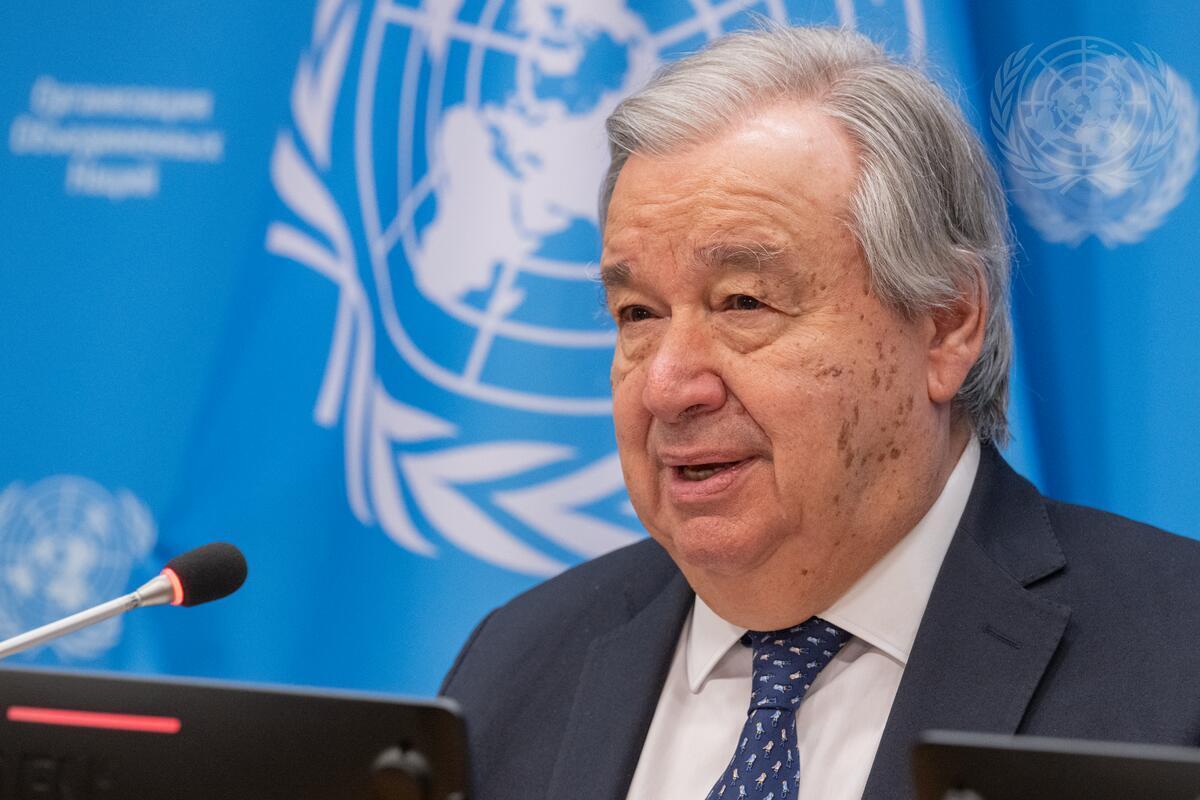Madam President,
Excellencies, Members of the Security Council,
Thank you for convening this ministerial meeting on the Situation in the Middle East.
After over a year of horrific war and bloodshed, the region is at a grim crossroads.
The war between Hamas and Israel has spread to the region –involving non-state armed groups and now engulfing large swaths of Lebanon in a war between Hizbullah and Israel, amidst repeated escalatory exchanges between Israel and Iran.
As feared, a year of armed exchanges across the Blue Line between Israel and Hezbollah has erupted into an all-out war.
Daily barrages of rocket fire from Lebanon towards northern and central Israel, massive Israeli airstrikes across Lebanon and an Israeli ground operation in southern Lebanon have led to alarmingly high numbers of casualties and massive destruction.
Armed groups operating from Yemen, Iraq and Syria have also continued to launch missiles and projectiles toward Israel, while Israel continues to strike in Yemen and Syria. Israel and Iran have also engaged in overt and direct military confrontations, with Iran launching hundreds of drones and ballistic missiles at Israel, and Israel conducting extensive airstrikes on Iran.
Madam President,
We are living a nightmare. The trauma and grief that has been unleashed is immeasurable. Hamas’s appalling terrorist attacks inside Israel on 7 October 2023 and Palestinian armed group’s killing and continued holding of hostages in unbearable conditions has devastated Israel. Grinding warfare and Israel’s devastating military campaign in Gaza has wrought mass destruction and enormous casualties. Most of the Palestinian population in Gaza has been displaced and whole areas of the Strip are being emptied and made uninhabitable.
These events will reverberate for generations and shape the region in ways we cannot yet fully comprehend.
Madam President, as this Council has been briefed repeatedly,
The humanitarian situation in Gaza, as winter begins, is catastrophic, particularly developments in the north of Gaza with a large-scale and near-total displacement of the population and widespread destruction and clearing of land, amidst what looks like a disturbing disregard for international humanitarian law.
The United Nations and its partners are working around the clock to bring assistance to the population in Gaza. But humanitarian agencies continue to face an incredible challenge and dangerous operational environment, as well as access restrictions that seriously hinder their vital work. Attacks on humanitarians and looting of aid – including by organized armed Palestinians – remains a serious and unaddressed obstacle, as was proven to be so on Saturday.
The current conditions are among the worst we’ve seen during the entire war and are not set to improve.
Meanwhile, Madam President,
The occupied West Bank remains stuck in a destructive spiral of violence and hopelessness.
Israeli military operations in Palestinian cities and refugee camps in Area A continue, often leading to armed exchanges with Palestinian militants, while Palestinian attacks against Israelis and high levels of settler-related violence also persist. In all of this – civilians continue to pay the price, very often and increasingly with their lives.
At the same time, settlement expansion continues unabated, as the Israeli Government has taken numerous steps to accelerate settlement advancement, with some ministers now openly calling for formal annexation of the West Bank in the coming months and establishing settlements inside Gaza. This comes in the wake of significant steps in recent months to reshape Israeli control in the West Bank, including not only settlement enlargement, but large-scale state land declarations and the appointment of a civilian deputy in the Civil Administration, thus deepening the illegal occupation.
These dynamics exact a political toll, further undermining the Palestinian Authority, which continues to face an ongoing fiscal and institutional crisis.
All told and combined with developments in Gaza and Israel’s recent passage of laws against UNRWA’s operations, I must issue an urgent warning that the very institutional framework of support to the Palestinian people and a viable Palestinian state are on the brink of dissolution, threatening to plunge the Occupied Palestinian Territory into even greater chaos.
Madam President,
How much more misery can ordinary people on both sides be expected to endure? What greater burden can we place on humanitarians to deliver? How much further can we bend the system of international laws and institutions meant to protect innocent civilians? How many times can we test the limits of restraint? How deeply can we allow Palestinian institutions to be undermined, threatening the very arrangements meant to ensure a peaceful settlement to this conflict?
Frankly, I don’t have the answers, but I can tell you that what we are living now is the result of us testing all these breaking points for way too long.
The steps being taken on the ground in Gaza and the occupied West Bank that I have outlined – not only today but over many briefings in this Council – are taking us further away from the peace process and ultimately a viable Palestinian state.
Armed resistance and military solutions will ultimately fail to provide safety or security for anyone. We need to see greater security for Israel and Palestinians’ realization of their right to self-determination.
Although preparations for recovery and reconstruction are well underway, humanitarian relief and reconstruction can be no more than band aids absent a political solution.
Mister President,
If the parties cannot find a path out of the perpetual warfare, then the international community must define the path forward.
The international community must act now – together with the parties – to change the dangerous course we are on.
Here is what we need: we need an immediate ceasefire and release of hostages in Gaza.
We need the ongoing and concerted diplomatic effort to deescalate tensions around the region, including a ceasefire in Lebanon anchored in the full implementation of UN Security Council Resolution 1701.
And we need to see implementation of concrete, irreversible steps towards a political framework that resolves the Israeli-Palestinian conflict, ends the occupation, and achieves a two-State solution.
The international community must put down clear markers on how to end the war in Gaza in a way that lays the groundwork for a viable and sustainable political future.
I have mentioned some of these principles in my recent briefings to the Council. I choose to reiterate them here today because they need urgent safeguarding and attention.
- Gaza is and must remain an integral part of a future Palestinian State – with no reductions in its territory. The repeated displacement of the Gaza population must cease, and people must be allowed to return to their homes.
- There should be no long-term Israeli military presence in Gaza, while at the same time Israel's legitimate security concerns, particularly in the wake of the acts of terror committed on 7 October, must be addressed. Calls for the reestablishment of Israeli settlements in Gaza must be firmly rejected and clearly opposed.
- Gaza and the West Bank must be unified politically, economically, and administratively. They must be governed by a Palestinian Government that is recognized and supported by the Palestinian people and the international community.
- There can be no long-term solution in Gaza that is not fundamentally political.
Mister President,
Supporting and sustaining a meaningful political process that can effectively address these issues will require an international community that is engaged and coordinated.
There must be a context in which the international community can muster the tools and a timeline for how this conflict should end, rooted in well-recognized principles, with the capacity to leverage the strengths, resources and influence of the region and international partners with the two parties.
We are again in need today of such a political framework, that will allow for a streamlined collective response to the acute recovery and reconstruction needs in Gaza, while ensuring these needs are addressed within the context of a political process that tangibly advances us towards a two-State solution and a lasting peace.
The UN remains fully committed to participate in and cooperate with such an effort, and to do its part to ensure that this awful war not only ends soon, but concludes in a way that ensures a better future for Palestinians, Israelis, and all in the region.
Thank you.






